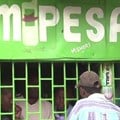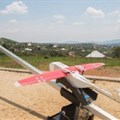His theory that innovation is better in Africa stems from the fact that, in Africa, we have a number of problems but the fact that we are able to find solutions for those problems is what differentiates us. If we don't solve them, no one will.
15 or 16 years ago the Economist dubbed Africa the hopeless continent, very quickly, however, the tables turned and all of a sudden 6 of the 10 fastest growing economies in the world were in Africa.
Very quickly a new narrative has arisen: Africa rising.
He referred to Hans Rosling whose statistics show the greatest change of our lifetime will be the growth of Africa’s population from 1-4 billion people by the end of the century. According to Rosling, something like 80% of all people will be living in either Africa or Asia by then. The potential is massive
Shapshak believes the potential is massive for Africa. "We will have over one billion people of a working age by 2050. We have the potential to leapfrog forward. We already have the missing or secret ingredient for all economies - the middle class. Why does the middle class matter? Well, they are the people who buy new phones, buy new contracts, buy cars, take out mortgages, in essence, we buy sht*t," he says.
Things have changed a lot over the years. Most things have shifted to the mobile phone.
Welcome to the future, welcome to Africa
Why are we able to innovate and leapfrog in the ways that we do? Well, apart from the fact that we have so many problems that we need to find solutions to, we don't have the old assets.
He likened the mobile industry to the gold industry: "A way to think about mobile is to think about the gold industry. To get gold out from the mines to the sea they needed railroads. The railroads were built and it was the first generation of the infrastructure developing. Analogise that to cellphone networks. To have mobile in Africa, the first thing we had to do was build the networks, the same way the railroads had to build the actual sleepers and the tracks. Then they needed the wood, the coal, and the water for the train tracks."
It's not underneath, it's on top!
The gold of today, however, is not under the ground, it's above the ground.
We are the gold. We, the people.
He referred to Nairobi, Kenya as the mobile epicentre of mobile innovation in the world at the moment. "The reason there's is such remarkable things happening there is because on top of the mobile networks (the building of the mobile networks - the first step of the infrastructure), came another step: a massive competitive fight for data. The cost of data came down radically and on the back of that, people started using their mobiles so much more.
The M-Pesa revolution
Then, along came M-Pesa which still remains arguably the most efficient mobile money solution in the world. It allows you to pay school fees, buy groceries, or even bribe customs officials.
Did you know that 44% of Kenya's GDP goes through M-Pesa every day? This equates to $148m a day. Inflation is influenced by M-Pesa.
There is almost no need for ATMs or bank branches when what you have in Africa are fruit sellers and hairdressers selling mobile money services. They are the human ATM network. You almost can't do anything in East Africa if you don't have M-Pesa. It's a revolution, says Shapshak. In Stone Town, Zanzibar, a man with no shoes and no running water has four ways to pay with mobile money.
Pay-as-you-go was a business model that didn’t exist until the early 90s in the kind of mass market way that it did when the mobile revolution came along. It was Vodacom that pioneered pay-as-you-go as a business model to let people pay for it. People can do just about anything with their phones - even feature phones. They can search Google with an SMS, they can update Facebook with an SMS. It's complicated, but it works!
Prepaid solar
Another great revolution on top of the mobile revolution, is prepaid solar. He told delegates about a company that charges a fee of about $200 for a solar panel booth with lights, so kids can study at night, a rechargable radio, a torch, plugs, etc. The company gets a deposit and then every day users pay the system off through M-Pesa and after a year, they own it. It's a game-changer.
"It is an empowering way to give people access to power and electricity that they never had before. Because the alternative is, they have to have a generator," he says.
"Something like $21bn a year is being spent on maintaining the electricity grid in Africa. $21bn on maintaining infrastructure, when right above us is this nuclear reactor in the sky that beams down power every day. In Africa, there is an average of 300 sunny days a year..."
Drone deliveries in Rwanda
In Rwanda, on the other hand, there are efficient drone deliveries of blood being made every single day by a company called Zipline. A rural clinic phones through to a base outside of Kigali and orders blood. The blood is then put in a box on a plane from where a catapult launches it and from the moment the plane is airborne it autonomously guides itself to the destination using cellphone networks.
The doctor will get an SMS - almost just like Uber - which lets them know the blood is arriving. A parachute is deployed and the box with the blood floats down and people's lives are saved as a result.
"The internet an mobile have changed our lives so much that we've had to redraw Maslow's hierarchy of basic needs. Who cares about shelter, as long as we've got Wi-Fi..."



































